Walbank F.W., Astin A.E., Frederiksen M.W., Ogilvie R.M. The Cambridge Ancient History, Volume 7, Part 1: The Hellenistic World
Подождите немного. Документ загружается.

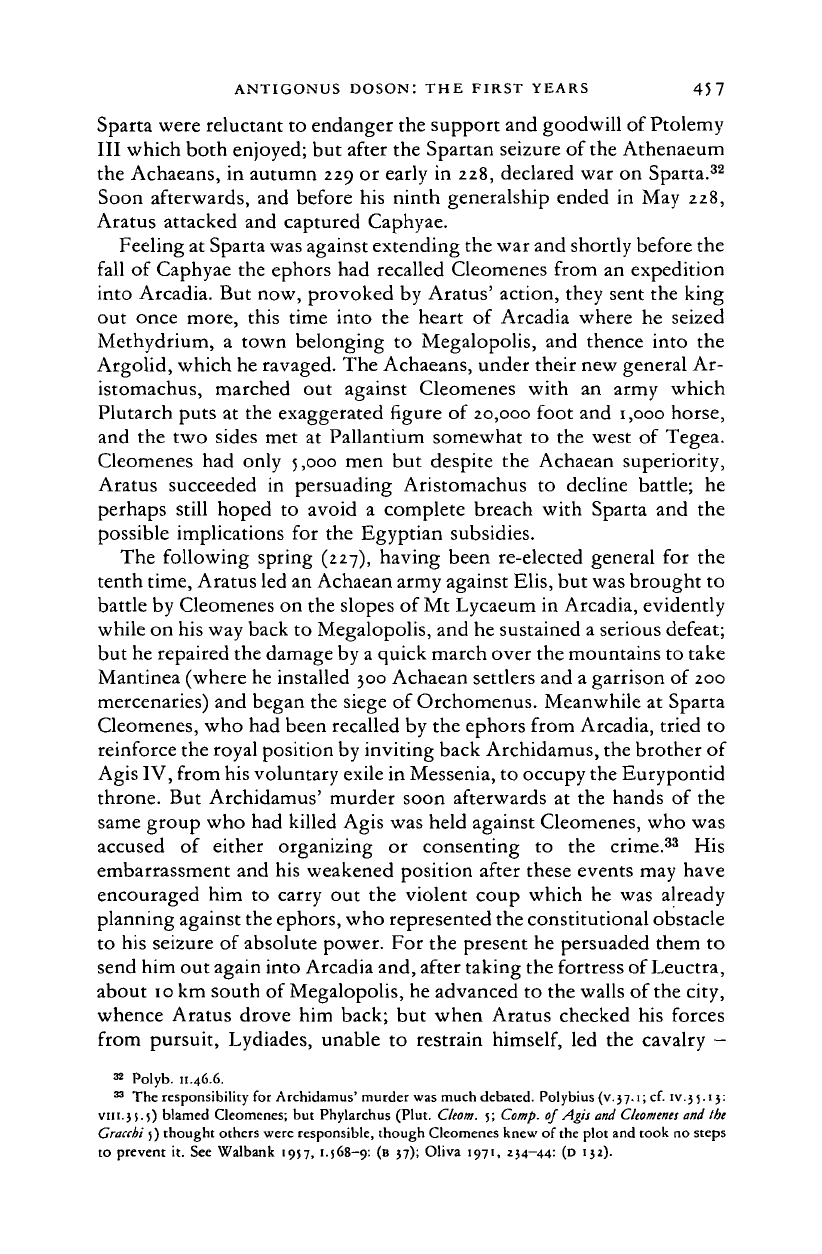
ANTIGONUS DOSON: THE FIRST YEARS 45 7
Sparta were reluctant
to
endanger the support and goodwill
of
Ptolemy
III which both enjoyed; but after the Spartan seizure
of
the Athenaeum
the Achaeans,
in
autumn 229
or
early
in
228, declared war
on
Sparta.
32
Soon afterwards,
and
before
his
ninth generalship ended
in
May 228,
Aratus attacked
and
captured Caphyae.
Feeling
at
Sparta was against extending the war and shortly before the
fall
of
Caphyae
the
ephors
had
recalled Cleomenes from
an
expedition
into Arcadia.
But
now, provoked
by
Aratus' action, they sent the king
out once more, this time into
the
heart
of
Arcadia where
he
seized
Methydrium,
a
town belonging
to
Megalopolis,
and
thence into
the
Argolid, which he ravaged. The Achaeans, under their new general Ar-
istomachus, marched
out
against Cleomenes with
an
army which
Plutarch puts
at
the exaggerated figure
of
20,000 foot and 1,000 horse,
and
the two
sides
met
at
Pallantium somewhat
to the
west
of
Tegea.
Cleomenes
had
only
5,000
men but
despite
the
Achaean superiority,
Aratus succeeded
in
persuading Aristomachus
to
decline battle;
he
perhaps still hoped
to
avoid
a
complete breach with Sparta
and the
possible implications
for the
Egyptian subsidies.
The following spring (227), having been re-elected general
for the
tenth time, Aratus led an Achaean army against Elis, but was brought
to
battle by Cleomenes
on
the slopes
of
Mt Lycaeum
in
Arcadia, evidently
while on his way back
to
Megalopolis, and he sustained a serious defeat;
but he repaired the damage by a quick march over the mountains to take
Mantinea (where he installed 300 Achaean settlers and a garrison
of
200
mercenaries) and began the siege
of
Orchomenus. Meanwhile
at
Sparta
Cleomenes, who had been recalled
by
the ephors from Arcadia, tried
to
reinforce the royal position by inviting back Archidamus, the brother of
Agis IV, from his voluntary exile in Messenia, to occupy the Eurypontid
throne.
But
Archidamus' murder soon afterwards
at
the
hands
of the
same group who had killed Agis was held against Cleomenes, who was
accused
of
either organizing
or
consenting
to the
crime.
33
His
embarrassment
and his
weakened position after these events may have
encouraged
him
to
carry
out the
violent coup which
he was
already
planning against the ephors, who represented the constitutional obstacle
to his seizure
of
absolute power.
For
the present
he
persuaded them
to
send him out again into Arcadia and, after taking the fortress of Leuctra,
about
10
km south
of
Megalopolis, he advanced
to
the walls
of
the city,
whence Aratus drove
him
back;
but
when Aratus checked
his
forces
from pursuit, Lydiades, unable
to
restrain
himself,
led the
cavalry
—
32
Polyb. 11.46.6.
33
The
responsibility
for
Archidamus' murder
was
much debated. Polybius
(v.37.1;
cf.
iv.35.15:
viii.} j.5) blamed Cleomenes;
but
Phylarchus (Plut. Cleom.
5;
Comp.
of
Agis
and
Cleomints
and the
Gracchi
j)
thought others were responsible, though Cleomenes knew
of
the plot and took no steps
to prevent
it. See
Walbank 19)7. 1.568—9: (B 57); Oliva 1971, 234-44: (D
132).
Cambridge Histories Online © Cambridge University Press, 2008
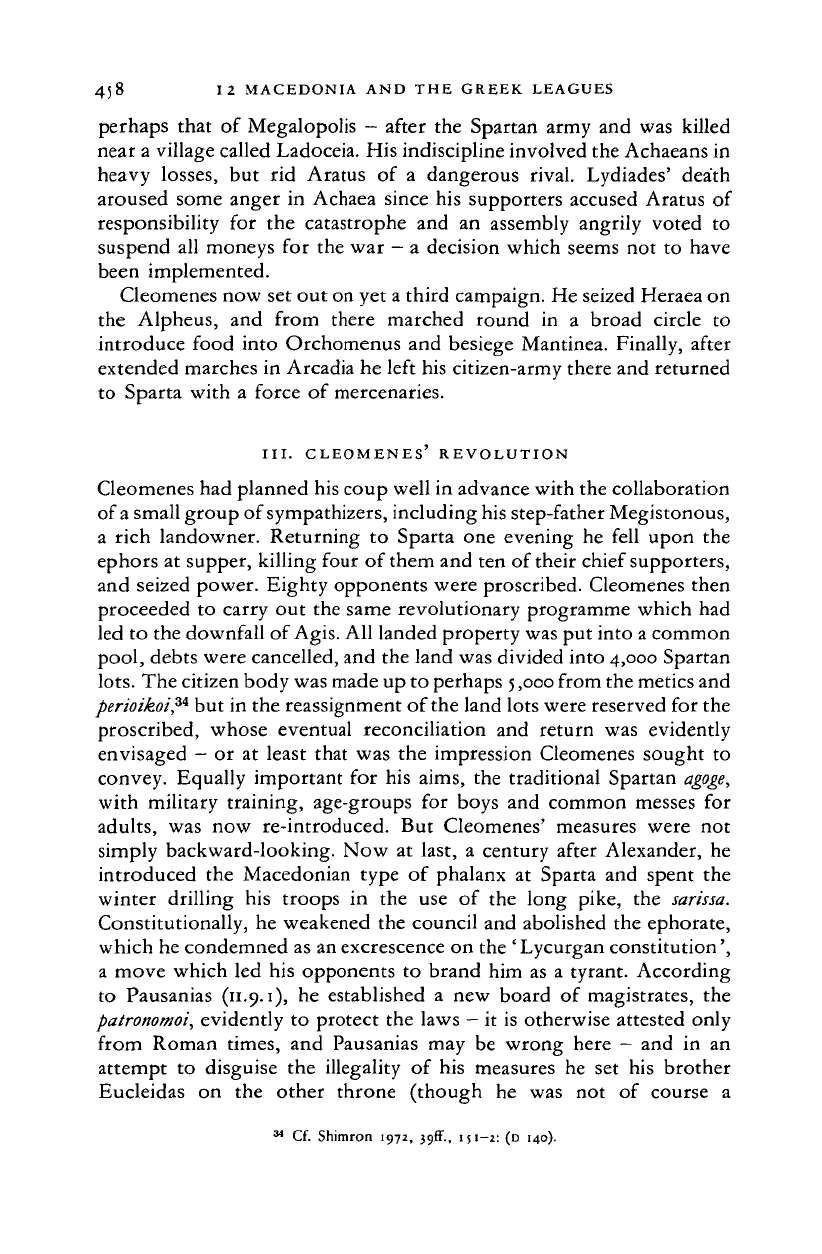
45 8
12
MACEDONIA AND THE GREEK LEAGUES
perhaps that of Megalopolis
-
after the Spartan army and was killed
near a village called Ladoceia. His indiscipline involved the Achaeans in
heavy losses, but rid Aratus
of a
dangerous rival. Lydiades' death
aroused some anger in Achaea since his supporters accused Aratus of
responsibility for the catastrophe and an assembly angrily voted
to
suspend all moneys for the war
—
a decision which seems not to have
been implemented.
Cleomenes now set out on yet a third campaign. He seized Heraea on
the Alpheus, and from there marched round
in a
broad circle
to
introduce food into Orchomenus and besiege Mantinea. Finally, after
extended marches in Arcadia he left his citizen-army there and returned
to Sparta with a force of mercenaries.
III.
CLEOMENES REVOLUTION
Cleomenes had planned his coup well in advance with the collaboration
of
a
small group of sympathizers, including his step-father Megistonous,
a rich landowner. Returning to Sparta one evening he fell upon the
ephors at supper, killing four of them and ten of their chief supporters,
and seized power. Eighty opponents were proscribed. Cleomenes then
proceeded to carry out the same revolutionary programme which had
led to the downfall of
Agis.
All landed property was put into a common
pool, debts were cancelled, and the land was divided into 4,000 Spartan
lots.
The citizen body was made up to perhaps
5,000
from the metics and
perioikoi,
zi
but in the reassignment of the land lots were reserved for the
proscribed, whose eventual reconciliation and return was evidently
envisaged
-
or at least that was the impression Cleomenes sought to
convey. Equally important for his aims, the traditional Spartan
agoge,
with military training, age-groups for boys and common messes for
adults, was now re-introduced. But Cleomenes' measures were not
simply backward-looking. Now at last,
a
century after Alexander, he
introduced the Macedonian type of phalanx
at
Sparta and spent the
winter drilling his troops
in
the use
of
the long pike, the sarissa.
Constitutionally, he weakened the council and abolished the ephorate,
which he condemned as an excrescence on the ' Lycurgan constitution',
a move which led his opponents to brand him as a tyrant. According
to Pausanias (11.9.1), he established
a
new board of magistrates, the
patronomoi,
evidently to protect the laws
—
it is otherwise attested only
from Roman times, and Pausanias may be wrong here
—
and in an
attempt to disguise the illegality of his measures he set his brother
Eucleidas
on the
other throne (though
he
was
not of
course
a
34
Cf. Shimron 1972,
$<)R.,
151-2: (D 140).
Cambridge Histories Online © Cambridge University Press, 2008
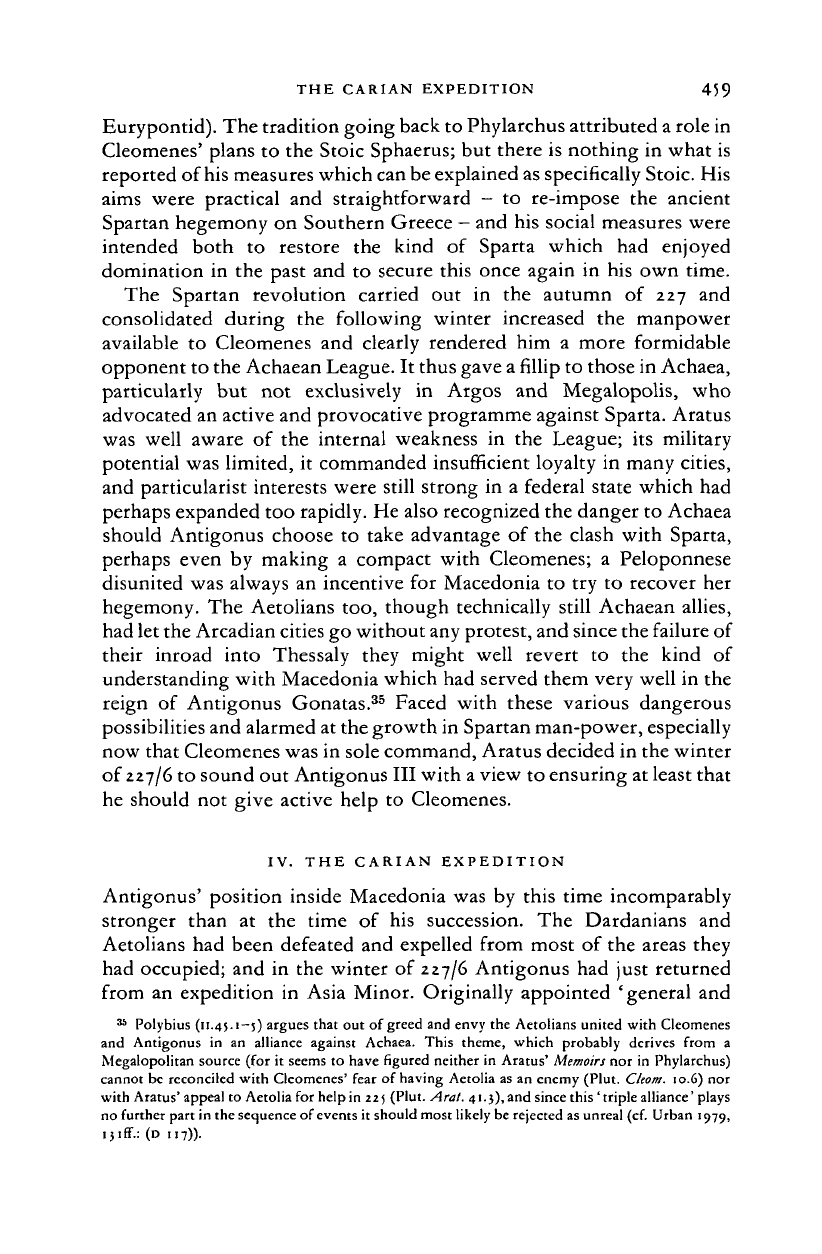
THE CARIAN EXPEDITION
459
Eurypontid). The tradition going back to Phylarchus attributed a role in
Cleomenes' plans
to
the Stoic Sphaerus; but there is nothing
in
what
is
reported of his measures which can be explained as specifically Stoic. His
aims were practical
and
straightforward
—
to
re-impose
the
ancient
Spartan hegemony on Southern Greece
—
and his social measures were
intended both
to
restore
the
kind
of
Sparta which
had
enjoyed
domination
in
the past and
to
secure this once again
in
his own time.
The Spartan revolution carried
out in the
autumn
of
227
and
consolidated during
the
following winter increased
the
manpower
available
to
Cleomenes
and
clearly rendered
him
a
more formidable
opponent to the Achaean League. It thus gave a
fillip
to those in Achaea,
particularly
but not
exclusively
in
Argos
and
Megalopolis,
who
advocated an active and provocative programme against Sparta. Aratus
was well aware
of
the
internal weakness
in
the
League;
its
military
potential was limited,
it
commanded insufficient loyalty
in
many cities,
and particularist interests were still strong
in a
federal state which had
perhaps expanded too rapidly. He also recognized the danger to Achaea
should Antigonus choose
to
take advantage
of
the clash with Sparta,
perhaps even
by
making
a
compact with Cleomenes;
a
Peloponnese
disunited was always
an
incentive
for
Macedonia
to try to
recover her
hegemony. The Aetolians too, though technically still Achaean allies,
had let the Arcadian cities go without any protest, and since the failure of
their inroad into Thessaly they might well revert
to the
kind
of
understanding with Macedonia which had served them very well in the
reign
of
Antigonus Gonatas.
35
Faced with these various dangerous
possibilities and alarmed at the growth in Spartan man-power, especially
now that Cleomenes was in sole command, Aratus decided in the winter
of 227/6 to sound out Antigonus III with
a
view to ensuring at least that
he should
not
give active help
to
Cleomenes.
IV. THE CARIAN EXPEDITION
Antigonus' position inside Macedonia was
by
this time incomparably
stronger than
at the
time
of his
succession.
The
Dardanians
and
Aetolians had been defeated and expelled from most
of
the areas they
had occupied; and
in
the winter
of
227/6 Antigonus had just returned
from
an
expedition
in
Asia Minor. Originally appointed 'general and
35
Polybius (11.45.1-5) argues that out
of
greed and envy the Aetolians united with Cleomenes
and Antigonus
in an
alliance against Achaea. This theme, which probably derives from
a
Megalopolitan source (for
it
seems
to
have figured neither
in
Aratus'
Memoirs
nor
in
Phylarchus)
cannot be reconciled with Cleomenes' fear
of
having Aetolia as an enemy (Plut.
Cleom.
10.6)
nor
with Aratus'appeal to Aetolia for help in 225 (Plut. Aral. 41.3), and since this 'triple alliance'plays
no further part in the sequence of events
it
should most likely be rejected as unreal (cf. Urban 1979,
i
3
iff.:
(D 117)).
Cambridge Histories Online © Cambridge University Press, 2008
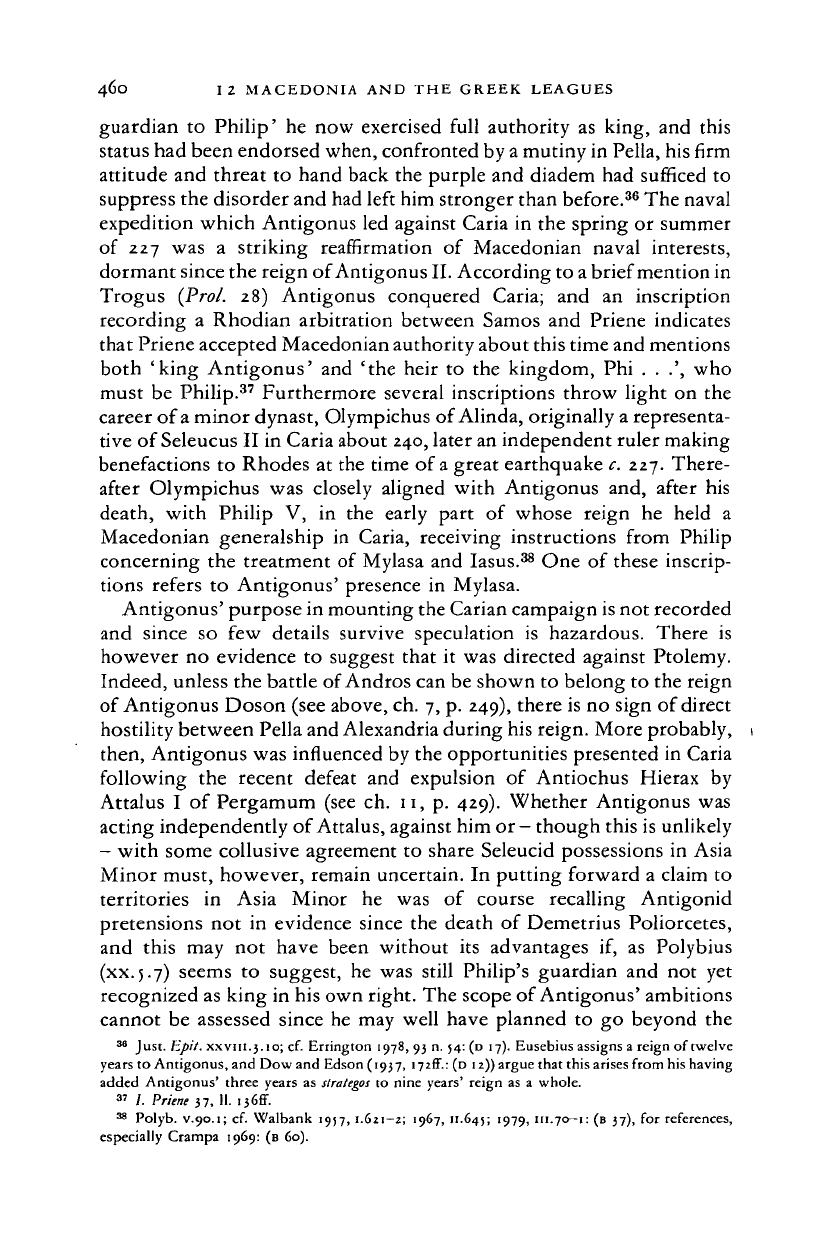
460 12 MACEDONIA AND THE GREEK LEAGUES
guardian
to
Philip'
he
now exercised full authority
as
king,
and
this
status had been endorsed when, confronted by
a
mutiny in Pella, his firm
attitude and threat
to
hand back the purple and diadem had sufficed
to
suppress the disorder and had left him stronger than before.
36
The naval
expedition which Antigonus led against Caria
in
the spring
or
summer
of
227 was a
striking reaffirmation
of
Macedonian naval interests,
dormant since the reign of Antigonus
II.
According to a brief mention in
Trogus (Pro/.
28)
Antigonus conquered Caria;
and an
inscription
recording
a
Rhodian arbitration between Samos
and
Priene indicates
that Priene accepted Macedonian authority about this time and mentions
both 'king Antigonus'
and 'the
heir
to the
kingdom,
Phi . . .', who
must
be
Philip.
37
Furthermore several inscriptions throw light
on the
career of a minor dynast, Olympichus of Alinda, originally a representa-
tive of Seleucus
II
in Caria about
240,
later an independent ruler making
benefactions
to
Rhodes
at
the time of
a
great earthquake
c.
227. There-
after Olympichus
was
closely aligned with Antigonus
and,
after
his
death, with Philip
V, in the
early part
of
whose reign
he
held
a
Macedonian generalship
in
Caria, receiving instructions from Philip
concerning
the
treatment
of
Mylasa and Iasus.
38
One
of
these inscrip-
tions refers
to
Antigonus' presence
in
Mylasa.
Antigonus' purpose in mounting the Carian campaign is not recorded
and since
so few
details survive speculation
is
hazardous. There
is
however
no
evidence
to
suggest that
it
was directed against Ptolemy.
Indeed, unless the battle of Andros can be shown to belong to the reign
of Antigonus Doson (see above, ch. 7, p. 249), there is no sign of direct
hostility between Pella and Alexandria during his reign. More probably,
then, Antigonus was influenced by the opportunities presented in Caria
following
the
recent defeat
and
expulsion
of
Antiochus Hierax
by
Attalus
I of
Pergamum (see ch. 11,
p.
429). Whether Antigonus was
acting independently of
Attalus,
against him or
—
though this is unlikely
- with some collusive agreement
to
share Seleucid possessions
in
Asia
Minor must, however, remain uncertain.
In
putting forward
a
claim
to
territories
in
Asia Minor
he was of
course recalling Antigonid
pretensions
not in
evidence since
the
death
of
Demetrius Poliorcetes,
and this
may not
have been without
its
advantages
if, as
Polybius
(xx.5.7) seems
to
suggest,
he
was still Philip's guardian
and not yet
recognized as king in his own right. The scope of Antigonus' ambitions
cannot
be
assessed since
he
may well have planned
to go
beyond
the
38
Just,
lipit.
xxVIII.3.10;
cf.
Errington 1978, 93
n.
54:
(D
17). Eusebius assigns a reign
of
twelve
years to Antigonus, and Dow and Edson (1937,
I72ff.:
(D
12)) argue that this arises from his having
added Antigonus' three years
as
strategos
to
nine years' reign
as a
whole.
3'
/.
Priene
37,
II.
i
3
6ff.
38
Polyb. v.90.1;
cf.
Walbank 1957,
1.621—2;
1967, 11.645; 1979, m.70— 1: (B 37),
for
references,
especially Crampa 1969: (B
60).
Cambridge Histories Online © Cambridge University Press, 2008
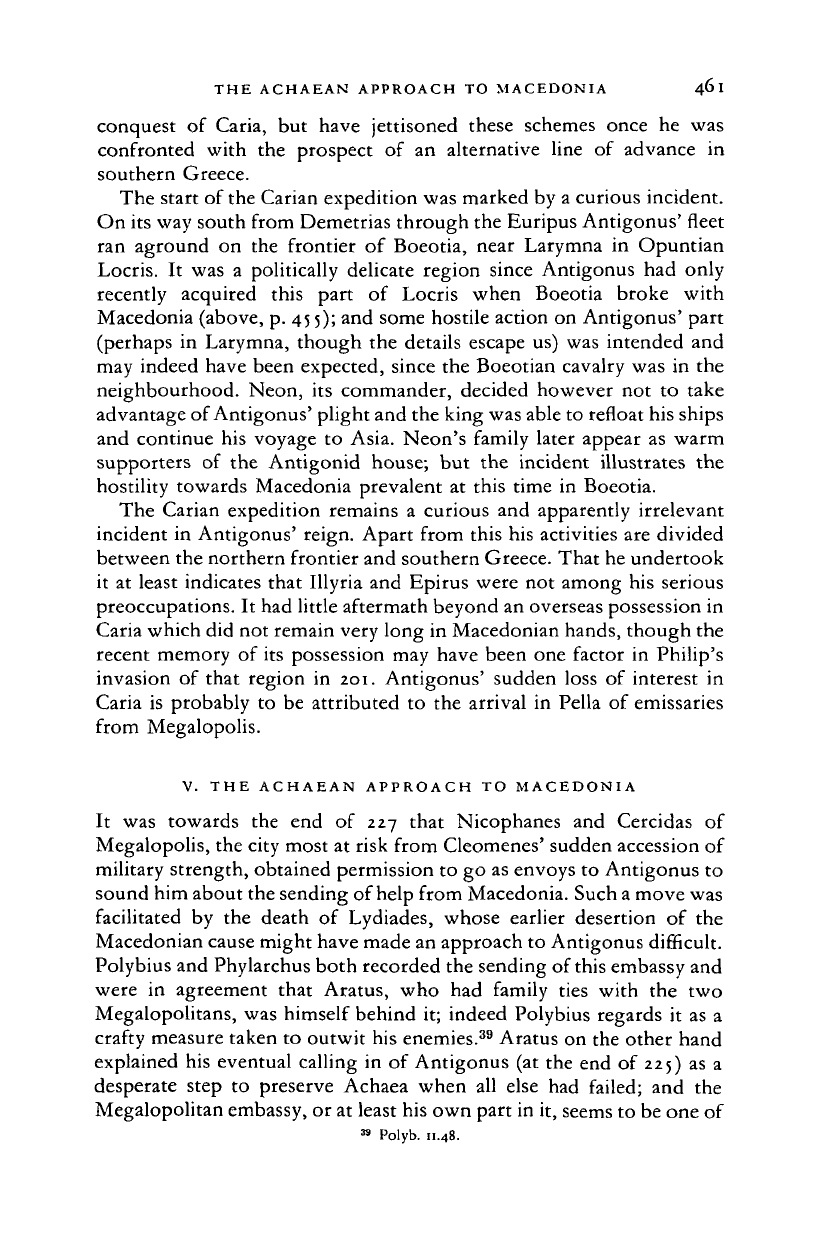
THE ACHAEAN APPROACH
TO
MACEDONIA
4^1
conquest
of
Caria,
but
have jettisoned these schemes once
he
was
confronted with the prospect
of
an
alternative line
of
advance
in
southern Greece.
The start of the Carian expedition was marked by a curious incident.
On its way south from Demetrias through the Euripus Antigonus' fleet
ran aground
on
the frontier
of
Boeotia, near Larymna
in
Opuntian
Locris.
It
was
a
politically delicate region since Antigonus had only
recently acquired this part
of
Locris when Boeotia broke with
Macedonia (above, p.
45
5);
and some hostile action on Antigonus' part
(perhaps in Larymna, though the details escape us) was intended and
may indeed have been expected, since the Boeotian cavalry was in the
neighbourhood. Neon, its commander, decided however not
to
take
advantage of Antigonus' plight and the king was able to refloat his ships
and continue his voyage to Asia. Neon's family later appear as warm
supporters
of
the Antigonid house; but the incident illustrates
the
hostility towards Macedonia prevalent at this time in Boeotia.
The Carian expedition remains
a
curious and apparently irrelevant
incident in Antigonus' reign. Apart from this his activities are divided
between the northern frontier and southern Greece. That he undertook
it at least indicates that Illyria and Epirus were not among his serious
preoccupations. It had little aftermath beyond an overseas possession in
Caria which did not remain very long in Macedonian hands, though the
recent memory of its possession may have been one factor in Philip's
invasion
of
that region
in
201. Antigonus' sudden loss
of
interest
in
Caria is probably to be attributed to the arrival in Pella of emissaries
from Megalopolis.
V. THE ACHAEAN APPROACH TO MACEDONIA
It was towards
the end
of
227 that Nicophanes
and
Cercidas
of
Megalopolis, the city most at risk from Cleomenes' sudden accession of
military strength, obtained permission to go as envoys to Antigonus to
sound him about the sending of
help
from Macedonia. Such
a
move was
facilitated
by
the death
of
Lydiades, whose earlier desertion
of
the
Macedonian cause might have made an approach to Antigonus difficult.
Polybius and Phylarchus both recorded the sending of
this
embassy and
were
in
agreement that Aratus, who had family ties with
the
two
Megalopolitans, was himself behind it; indeed Polybius regards
it
as
a
crafty measure taken to outwit his enemies.
39
Aratus on the other hand
explained his eventual calling in of Antigonus (at the end
of
225) as
a
desperate step
to
preserve Achaea when all else had failed; and
the
Megalopolitan embassy, or at least his own part in it, seems to be one of
39
Polyb. 11.48.
Cambridge Histories Online © Cambridge University Press, 2008
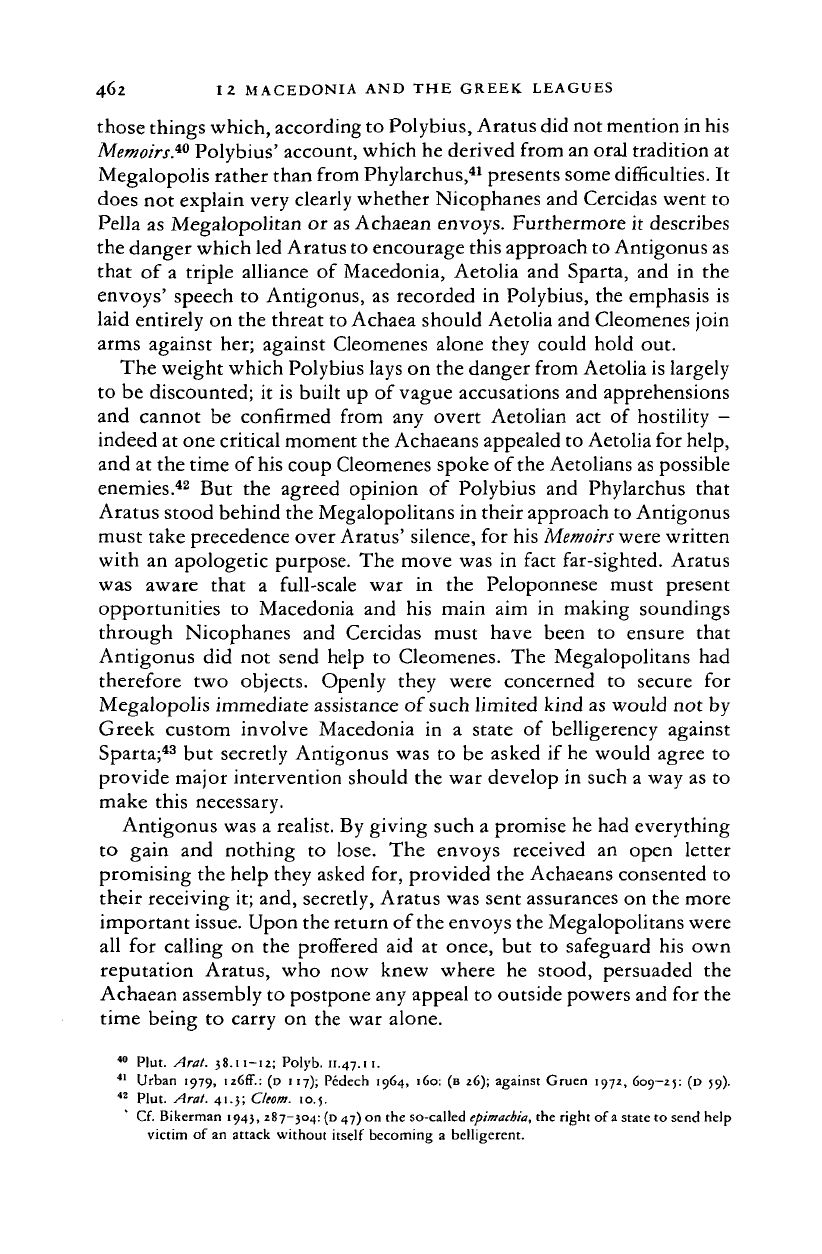
462 12 MACEDONIA AND THE GREEK LEAGUES
those things which, according to Polybius, Aratus did not mention in his
Memoirs.*
0
Polybius' account, which he derived from an oral tradition at
Megalopolis rather than from Phylarchus,
41
presents some difficulties. It
does not explain very clearly whether Nicophanes and Cercidas went to
Pella as Megalopolitan or as Achaean envoys. Furthermore it describes
the danger which led Aratus to encourage this approach to Antigonus as
that
of
a triple alliance of Macedonia, Aetolia and Sparta, and in the
envoys' speech to Antigonus, as recorded in Polybius, the emphasis is
laid entirely on the threat to Achaea should Aetolia and Cleomenes join
arms against her; against Cleomenes alone they could hold out.
The weight which Polybius lays on the danger from Aetolia is largely
to be discounted; it is built up of vague accusations and apprehensions
and cannot be confirmed from any overt Aetolian act
of
hostility
—
indeed at one critical moment the Achaeans appealed to Aetolia for help,
and at the time of
his
coup Cleomenes spoke of
the
Aetolians as possible
enemies.
42
But the agreed opinion
of
Polybius and Phylarchus that
Aratus stood behind the Megalopolitans in their approach to Antigonus
must take precedence over Aratus' silence, for his
Memoirs
were written
with an apologetic purpose. The move was in fact far-sighted. Aratus
was aware that
a
full-scale
war in the
Peloponnese must present
opportunities
to
Macedonia and his main aim
in
making soundings
through Nicophanes and Cercidas must have been
to
ensure that
Antigonus did not send help to Cleomenes. The Megalopolitans had
therefore two objects. Openly they were concerned
to
secure
for
Megalopolis immediate assistance of such limited kind as would not by
Greek custom involve Macedonia
in a
state
of
belligerency against
Sparta;
43
but secretly Antigonus was to be asked
if
he would agree to
provide major intervention should the war develop in such a way as to
make this necessary.
Antigonus was a realist. By giving such a promise he had everything
to gain and nothing
to
lose. The envoys received
an
open letter
promising the help they asked for, provided the Achaeans consented to
their receiving it; and, secretly, Aratus was sent assurances on the more
important
issue.
Upon the return of the envoys the Megalopolitans were
all for calling on the proffered aid
at
once, but to safeguard his own
k reputation Aratus, who now knew where
he
stood, persuaded
the
\ Achaean assembly to postpone any appeal to outside powers and for the
A time being to carry on the war alone.
40
Plut. Aral. 38.11-12; Polyb.
11.47.11.
41
Urban
1979,
iz6ff.:
(D 117);
Pedech
1964, 160: (B 26);
against Gruen
1972,
609-25:
(D 59).
42
Plut. Aral.
41.3;
Chom.
10.y
Cf.
Bikerman 1943, 287-304:
(D
47) on the
so-called epimachia,
the
right
of a
state
to
send help
victim
of an
attack without itself becoming
a
belligerent.
Cambridge Histories Online © Cambridge University Press, 2008
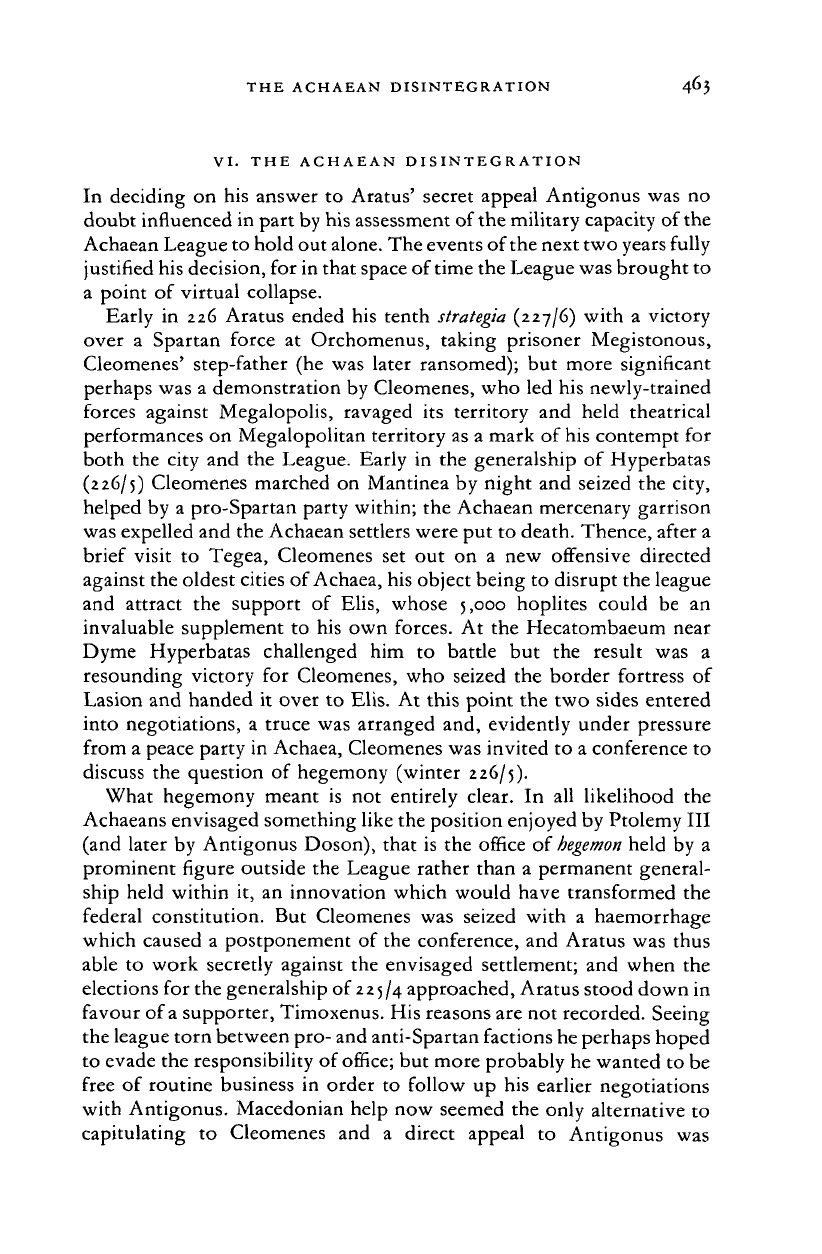
THE ACHAEAN DISINTEGRATION 463
VI.
THE ACHAEAN DISINTEGRATION
In deciding on his answer to Aratus' secret appeal Antigonus was no
doubt influenced in part by his assessment of the military capacity of the
Achaean League to hold out
alone.
The events of the next two years fully
justified his decision, for in that space of
time
the League was brought to
a point of virtual collapse.
Early in 226 Aratus ended his tenth
strategia
(227/6) with a victory
over
a
Spartan force
at
Orchomenus, taking prisoner Megistonous,
Cleomenes' step-father (he was later ransomed); but more significant
perhaps was a demonstration by Cleomenes, who led his newly-trained
forces against Megalopolis, ravaged its territory and held theatrical
performances on Megalopolitan territory as a mark of his contempt for
both the city and the League. Early in the generalship of Hyperbatas
(226/5) Cleomenes marched on Mantinea by night and seized the city,
helped by a pro-Spartan party within; the Achaean mercenary garrison
was expelled and the Achaean settlers were put to death. Thence, after a
brief visit to Tegea, Cleomenes set out on
a
new offensive directed
against the oldest cities of Achaea, his object being to disrupt the league
and attract the support
of
Elis, whose
5,000
hoplites could be
an
invaluable supplement to his own forces. At the Hecatombaeum near
Dyme Hyperbatas challenged him
to
battle but the result was
a
resounding victory for Cleomenes, who seized the border fortress of
Lasion and handed it over to Elis. At this point the two sides entered
into negotiations, a truce was arranged and, evidently under pressure
from a peace party in Achaea, Cleomenes was invited to a conference to
discuss the question of hegemony (winter 226/5).
What hegemony meant
is
not entirely clear.
In
all likelihood the
Achaeans envisaged something like the position enjoyed by Ptolemy III
(and later by Antigonus Doson), that is the office of
hegemon
held by a
prominent figure outside the League rather than a permanent general-
ship held within it, an innovation which would have transformed the
federal constitution. But Cleomenes was seized with
a
haemorrhage
which caused a postponement of the conference, and Aratus was thus
able to work secretly against the envisaged settlement; and when the
elections for the generalship of 225/4 approached, Aratus stood down in
favour of
a
supporter, Timoxenus. His reasons are not recorded. Seeing
the league torn between pro- and anti-Spartan factions he perhaps hoped
to evade the responsibility of
orifice;
but more probably he wanted to be
free of routine business in order to follow up his earlier negotiations
with Antigonus. Macedonian help now seemed the only alternative to
capitulating
to
Cleomenes and
a
direct appeal
to
Antigonus was
Cambridge Histories Online © Cambridge University Press, 2008
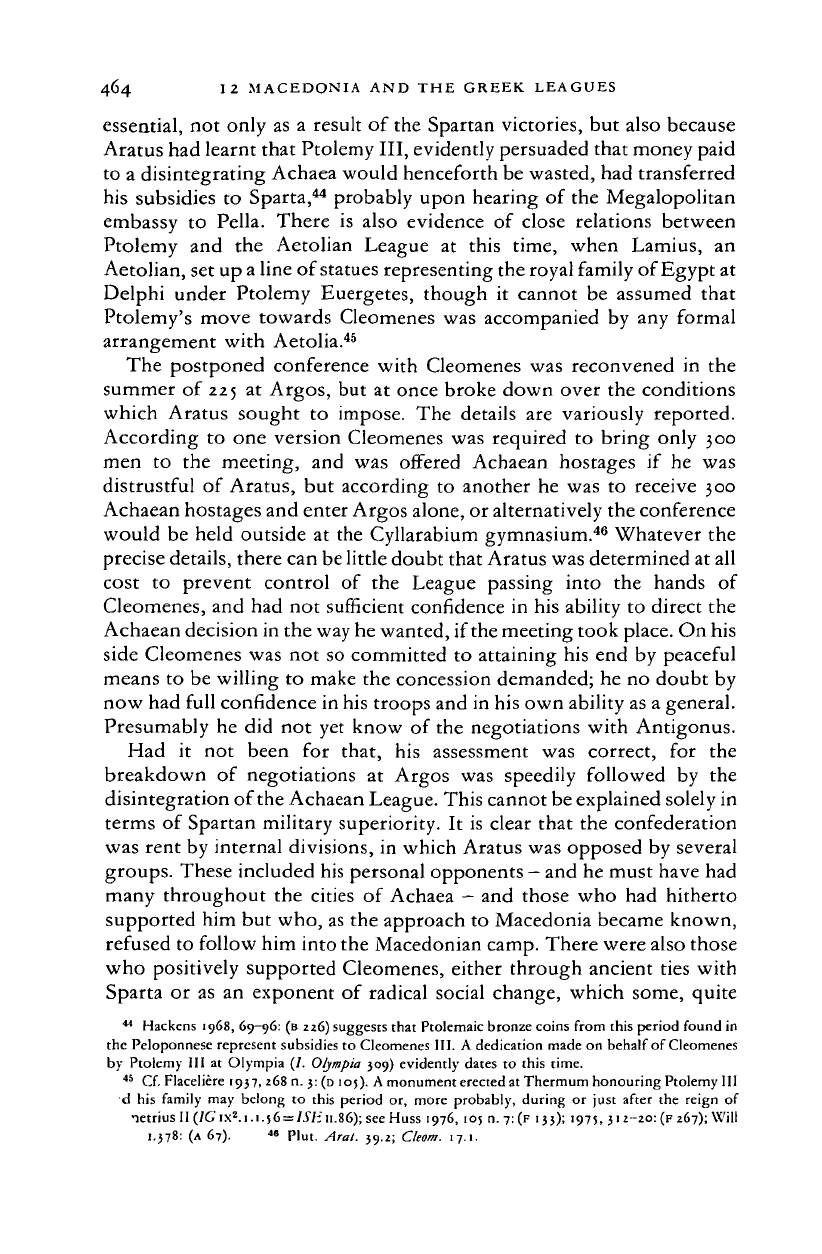
464 12 MACEDONIA AND THE GREEK LEAGUES
essential, not only as
a
result of the Spartan victories, but also because
Aratus had learnt that Ptolemy III, evidently persuaded that money paid
to a disintegrating Achaea would henceforth be wasted, had transferred
his subsidies to Sparta,
44
probably upon hearing of the Megalopolitan
embassy
to
Pella. There
is
also evidence
of
close relations between
Ptolemy and
the
Aetolian League
at
this time, when Lamius,
an
Aetolian, set up
a
line of statues representing the royal family of Egypt at
Delphi under Ptolemy Euergetes, though
it
cannot be assumed that
Ptolemy's move towards Cleomenes was accompanied by any formal
arrangement with Aetolia.
45
The postponed conference with Cleomenes was reconvened in the
summer of 225 at Argos, but at once broke down over the conditions
which Aratus sought
to
impose. The details are variously reported.
According to one version Cleomenes was required to bring only 300
men
to
the meeting, and was offered Achaean hostages
if
he was
distrustful of Aratus, but according to another he was to receive 300
Achaean hostages and enter Argos alone, or alternatively the conference
would be held outside at the Cyllarabium gymnasium.
46
Whatever the
precise details, there can be little doubt that Aratus was determined at all
cost
to
prevent control
of
the League passing into
the
hands
of
Cleomenes, and had not sufficient confidence in his ability to direct the
Achaean decision in the way he wanted, if the meeting took
place.
On his
side Cleomenes was not so committed to attaining his end by peaceful
means to be willing to make the concession demanded; he no doubt by
now had full confidence in his troops and in his own ability as a general.
Presumably he did not yet know of the negotiations with Antigonus.
Had
it not
been
for
that,
his
assessment was correct,
for the
breakdown
of
negotiations
at
Argos was speedily followed
by the
disintegration of the Achaean League. This cannot be explained solely in
terms of Spartan military superiority.
It
is clear that the confederation
was rent by internal divisions, in which Aratus was opposed by several
groups. These included his personal opponents
—
and he must have had
many throughout the cities
of
Achaea
—
and those who had hitherto
supported him but who, as the approach to Macedonia became known,
refused to follow him into the Macedonian camp. There were also those
who positively supported Cleomenes, either through ancient ties with
Sparta or as an exponent
of
radical social change, which some, quite
44
Hackens
1968,
69-96:
(B 226)
suggests that Ptolemaic bronze coins from this period found
in
the Peloponnese represent subsidies
to
Cleomenes
III. A
dedication made
on
behalf
of
Cleomenes
by Ptolemy
III
at
Olympia
(7.
Olympia
309)
evidently dates
to
this
time.
45
Cf.
Flaceliere
1937, 268 n. 3:
(D
105). A
monument erected
at
Thermum honouring Ptolemy
III
d
his
family
may
belong
to
this period
or,
more
probably,
during
or
just after
the
reign
of
netrius
II
(/Gix*.
1.1.56
=/J7f
11.86);
seeHuss
1976,
IOJ
n. 7:
(F
133);
1975,312-20:
(F
267);
Will
1.378:
(A 67).
«
Plut.
Aral.
39.2;
Cleom.
17.1.
Cambridge Histories Online © Cambridge University Press, 2008
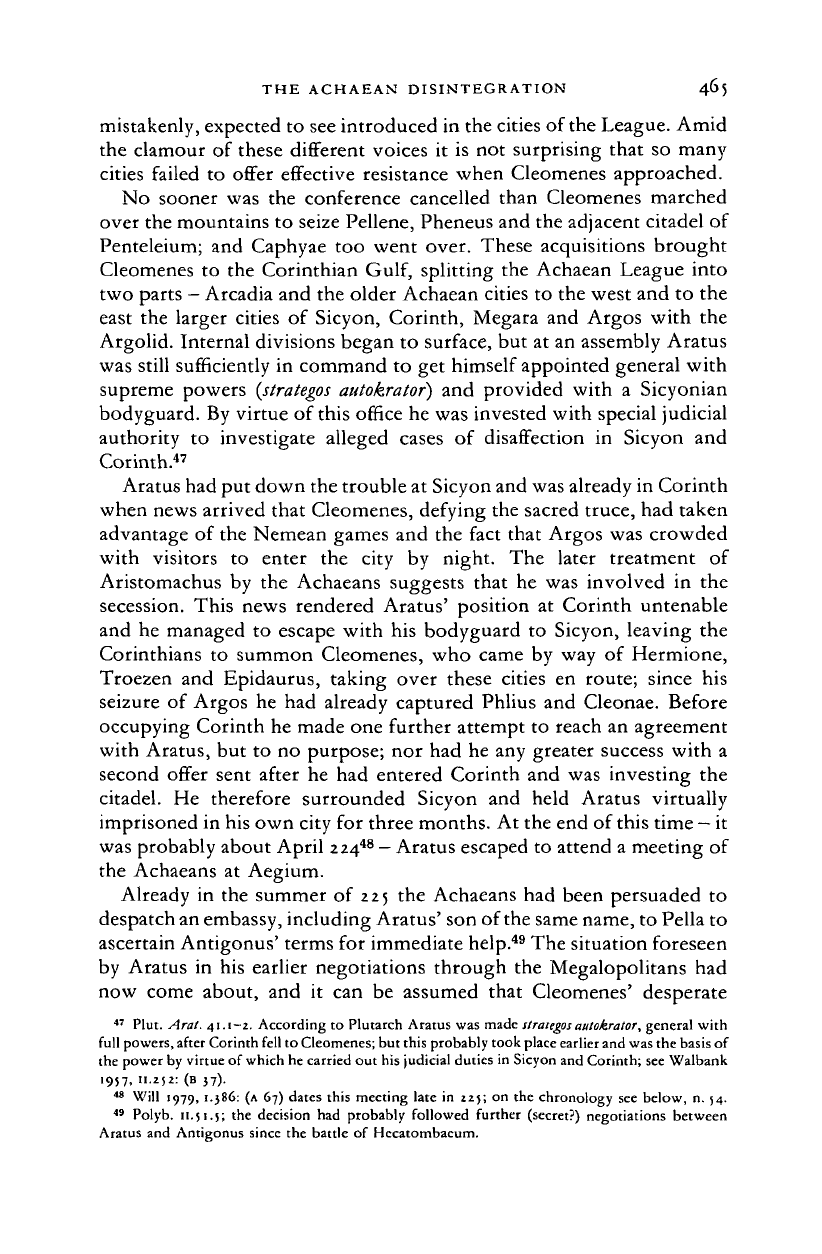
THE ACHAEAN DISINTEGRATION 465
mistakenly, expected
to
see introduced
in
the cities
of
the League. Amid
the clamour
of
these different voices
it
is not
surprising that
so
many
cities failed
to
offer effective resistance when Cleomenes approached.
No sooner
was the
conference cancelled than Cleomenes marched
over the mountains
to
seize Pellene, Pheneus and the adjacent citadel of
Penteleium;
and
Caphyae
too
went over. These acquisitions brought
Cleomenes
to the
Corinthian
Gulf,
splitting
the
Achaean League into
two parts
—
Arcadia and the older Achaean cities
to
the west and
to the
east
the
larger cities
of
Sicyon, Corinth, Megara
and
Argos with
the
Argolid. Internal divisions began
to
surface,
but at an
assembly Aratus
was still sufficiently
in
command
to get
himself appointed general with
supreme powers
(strategos autokrator)
and
provided with
a
Sicyonian
bodyguard. By virtue
of
this office
he
was invested with special judicial
authority
to
investigate alleged cases
of
disaffection
in
Sicyon
and
Corinth.
47
Aratus had put down the trouble at Sicyon and was already in Corinth
when news arrived that Cleomenes, defying the sacred truce, had taken
advantage
of
the Nemean games
and the
fact that Argos was crowded
with visitors
to
enter
the
city
by
night.
The
later treatment
of
Aristomachus
by the
Achaeans suggests that
he was
involved
in
the
secession. This news rendered Aratus' position
at
Corinth untenable
and
he
managed
to
escape with
his
bodyguard
to
Sicyon, leaving
the
Corinthians
to
summon Cleomenes,
who
came
by way
of
Hermione,
Troezen
and
Epidaurus, taking over these cities
en
route; since
his
seizure
of
Argos
he had
already captured Phlius
and
Cleonae. Before
occupying Corinth
he
made one further attempt
to
reach
an
agreement
with Aratus,
but to no
purpose;
nor had he
any greater success with
a
second offer sent after
he had
entered Corinth
and was
investing
the
citadel.
He
therefore surrounded Sicyon
and
held Aratus virtually
imprisoned in his own city
for
three months.
At
the end
of
this time
-
it
was probably about April 2
24
48
-
Aratus escaped
to
attend a meeting
of
the Achaeans
at
Aegium.
Already
in the
summer
of
225
the
Achaeans
had
been persuaded
to
despatch an embassy, including Aratus' son of the same name, to Pella
to
ascertain Antigonus' terms
for
immediate help.
49
The situation foreseen
by Aratus
in his
earlier negotiations through
the
Megalopolitans
had
now come about,
and
it
can be
assumed that Cleomenes' desperate
47
Plut. Arat. 41.1—2. According
to
Plutarch Aratus
was
made strategos aatoMrator, general with
full powers, after Corinth fell to Cleomenes; but this probably took place earlier and was the basis of
the power by virtue
of
which he carried out his judicial duties in Sicyon and Corinth; see Walbank
'957.
11-252: (B
}7).
48
Will 1979,
1.386:
(A 67) dates this meeting late
in
225;
on
the chronology see below,
n.
54.
49
Polyb. 11.51.5;
the
decision
had
probably followed further (secret?) negotiations between
Aratus and Antigonus since
the
battle
of
Hecatombaeum.
Cambridge Histories Online © Cambridge University Press, 2008
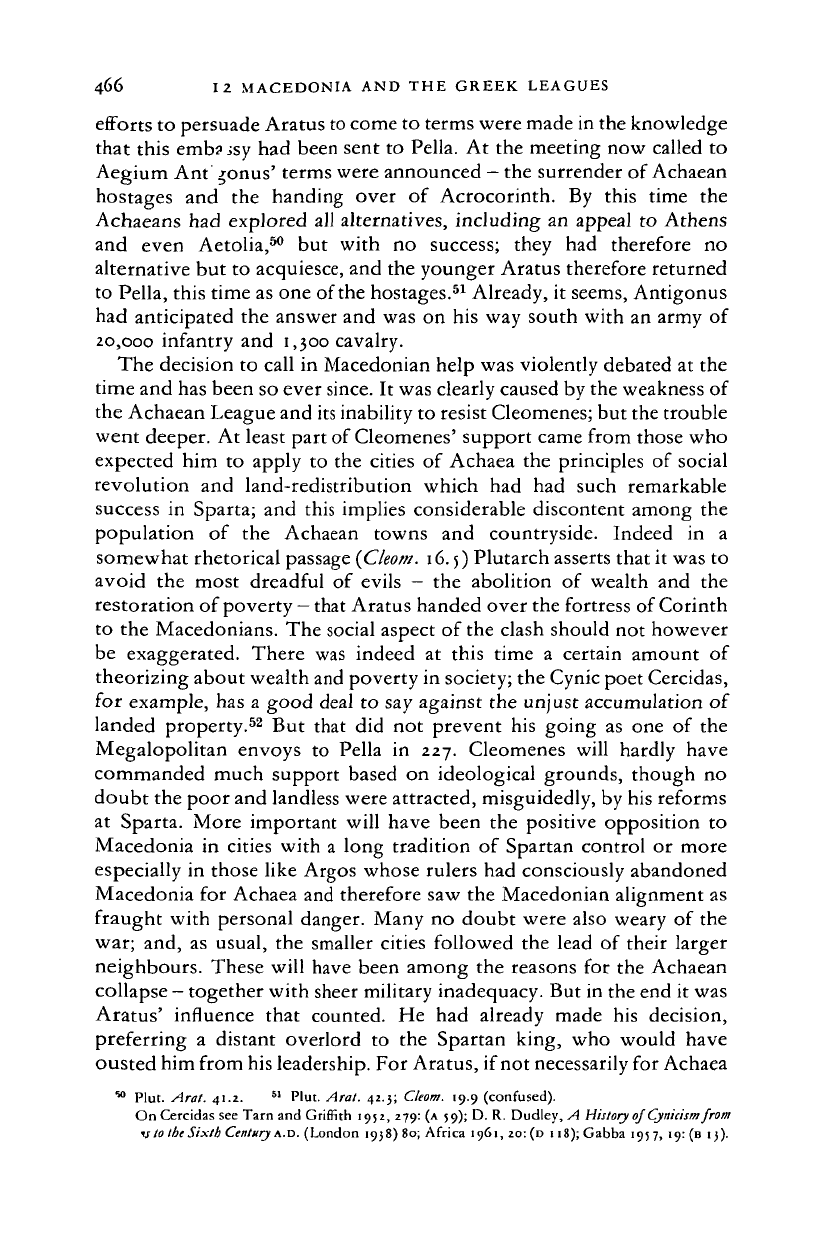
466 12 MACEDONIA AND THE GREEK LEAGUES
efforts to persuade Aratus to come to terms were made in the knowledge
that this emb? isy
had
been sent
to
Pella.
At the
meeting now called
to
Aegium Ant gonus' terms were announced
—
the surrender
of
Achaean
hostages
and the
handing over
of
Acrocorinth.
By
this time
the
Achaeans
had
explored all alternatives, including
an
appeal
to
Athens
and even Aetolia,
50
but
with
no
success; they
had
therefore
no
alternative but
to
acquiesce, and the younger Aratus therefore returned
to Pella, this time as one of the hostages.
51
Already,
it
seems, Antigonus
had anticipated
the
answer and was
on his
way south with
an
army
of
20,000 infantry
and
1,300 cavalry.
The decision
to
call
in
Macedonian help was violently debated
at
the
time and has been so ever since.
It
was clearly caused by the weakness of
the Achaean League and its inability to resist Cleomenes; but the trouble
went deeper. At least part
of
Cleomenes' support came from those who
expected
him to
apply
to the
cities
of
Achaea
the
principles
of
social
revolution
and
land-redistribution which
had had
such remarkable
success
in
Sparta;
and
this implies considerable discontent among
the
population
of the
Achaean towns
and
countryside. Indeed
in a
somewhat rhetorical passage
{Cleom.
16.5) Plutarch asserts that
it
was
to
avoid
the
most dreadful
of
evils
- the
abolition
of
wealth
and the
restoration
of
poverty
-
that Aratus handed over the fortress of Corinth
to
the
Macedonians. The social aspect
of
the clash should
not
however
be exaggerated. There
was
indeed
at
this time
a
certain amount
of
theorizing about wealth and poverty in society; the Cynic poet Cercidas,
for example, has
a
good deal
to
say against the unjust accumulation
of
landed property.
52
But
that
did not
prevent
his
going
as one of the
Megalopolitan envoys
to
Pella
in 227.
Cleomenes will hardly have
commanded much support based
on
ideological grounds, though
no
doubt the poor and landless were attracted, misguidedly, by his reforms
at Sparta. More important will have been
the
positive opposition
to
Macedonia
in
cities with
a
long tradition
of
Spartan control
or
more
especially
in
those like Argos whose rulers had consciously abandoned
Macedonia
for
Achaea and therefore saw the Macedonian alignment
as
fraught with personal danger. Many
no
doubt were also weary
of
the
war;
and, as
usual,
the
smaller cities followed
the
lead
of
their larger
neighbours. These will have been among
the
reasons
for
the Achaean
collapse
—
together with sheer military inadequacy. But in the end
it
was
Aratus' influence that counted.
He had
already made
his
decision,
preferring
a
distant overlord
to the
Spartan king,
who
would have
ousted him from his leadership. For Aratus, if not necessarily for Achaea
M
Plut. Aral. 41.2.
51
Plut. Aral. 42.3;
Cleom.
19.9 (confused).
On Cercidas see Tarn and Griffith 1952, 279:
(A
59); D. R. Dudley,
A
History
of Cynicism from
v
to the
Sixth
Century
A.D.
(London 1938) 80; Africa 1961,
20:
(D
I
18);
Gabba 1957,
19:
(B
13).
Cambridge Histories Online © Cambridge University Press, 2008
